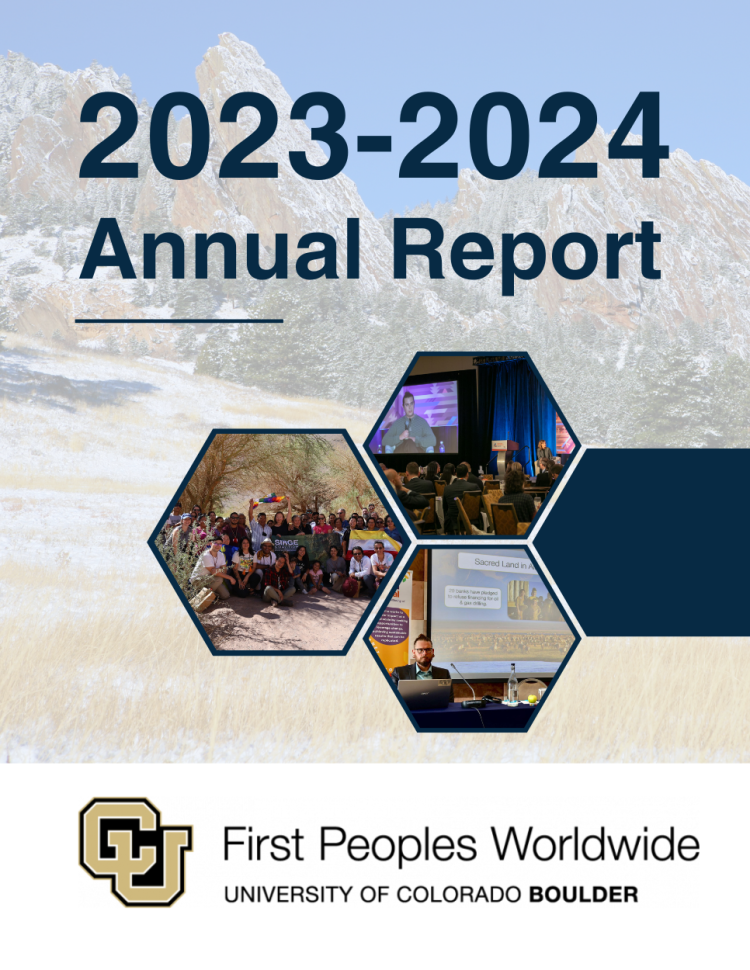First Peoples Worldwide at CU Boulder July 2023-June 2024 Annual Report

Our 2024 Annual Report encompasses projects and achievements from July 2023 through June 2024 and highlights First Peoples' work to support Indigenous leaders in shareholder advocacy and build investor support to forward and integrate Indigenous Peoples' rights in routine business operations.
Message from the Executive Director
It is with great pleasure that I invite you to read our fourth Annual Report. Since housed at the University of Colorado Boulder seven years ago, we have fulfilled First Peoples Worldwide’s longstanding mission by adapting to changing situations and priorities of the Indigenous rights movement and designing for continuous industry shifts. We are flexible to meet these shifts by weaving our programmatic pillars together to encourage partnership, connectivity, and exchange.
Indigenous expertise leads our work, and in this past year we were grateful for all the ways we were able to glean insights from the field. Our work took us in-person to South Africa for a shareholder training for 60 Indigenous communities; to South America for community engagement and field work; to Geneva and New York to support Indigenous leaders building networks in international forums; and throughout North America to connect with Indigenous and investor partners at conferences and convenings.
Among highlights:
- We brought together Indigenous leaders to speak with investors virtually and directly about urgent issues of impact from energy development, mineral mining, the hospitality industry, and more.
- We met increasing demand to provide Indigenous leaders, investors, and corporate decision-makers training that aligns business practice with the rights of Indigenous Peoples.
- We provided investors with analysis of Indigenous Peoples’ rights and participation in proxy resolutions and supported Indigenous leaders during Annual General Meetings.
- We presented our catalytic capital research at numerous conferences, gatherings, and virtual convenings to demonstrate how investment through creative capital to Indigenous-led enterprise can build successful, sustainable economies and overcome obstacles from historically exclusionary policy and practices.
- We co-authored a guide for Indigenous leaders to work with their communities to develop their own process and protocols around free, prior and informed consent (FPIC).
In all of these, we carried knowledge from site visits to demonstrate Indigenous Peoples’ ascendant power in solving for our shared global challenges. We consistently messaged that FPIC is not to be defined by the private sector, rather it is the private sector’s responsibility to design their operations to respect FPIC. Our message was grounded in the fact that Indigenous Peoples are increasingly proffering their own FPIC processes and protocols; and this is the starting place for investors, companies, and shareholders.
As I reflected in our newsletter earlier this year, one question has surfaced repeatedly from all corners of the Indigenous Peoples’ rights movement: What exactly makes the green economy different? Though coded as "green," it is business as usual in Indigenous homelands and territories, where development is being driven by external parties without opportunity to integrate Indigenous Peoples’ economic priorities or enterprise visions. Through our leadership role in the Securing Indigenous Peoples’ Rights in the Green Economy (SIRGE) Coalition and in conversations with standard setting institutions and industry leaders, we are working to shift systems so that Indigenous leaders can implement their self-determined priorities.
The work we achieved this year was due in no small part to growing our team more than twofold. New team members have stepped into their roles with care and a deep commitment to use their expertise and expand the impact of our work (see the full team on page 28).
Our team’s vision, energy, and acumen has grown relationships across the ecosystem; increased expert presence at industry meetings and international forums; widened analysis and our scope of research for Indigenous Peoples to lead through shareholder advocacy; and availed more trainings and knowledge exchange opportunities with both new and longstanding partners.
This year we implemented a strategic planning process with our team and in consultation with our advisory board. Our vision for the future:
- We lead as a known expert for Indigenous Peoples and investors to understand the business case for respect of Indigenous Peoples;
- We have grown Indigenous investor power in shareholder advocacy;
- Our materials have mainstreamed consideration of Indigenous Peoples’ rights in global contexts; and,
- Our internal infrastructure supports the team to work in alignment with our values.
As we look ahead, we dovetail from our mission and task ourselves to fundamentally transform how the private sector engages around the rights of Indigenous Peoples; leverage investor expertise and leadership to center Indigenous Peoples’ priorities and wellbeing; and catalyze systems change that prioritizes the rights of Indigenous Peoples in business operations.
There is much underway for the coming year. I look forward to sharing more with you soon and connecting and collaborating to meet this moment.
Kate R. Finn
Executive Director, First Peoples Worldwide at CU Boulder

